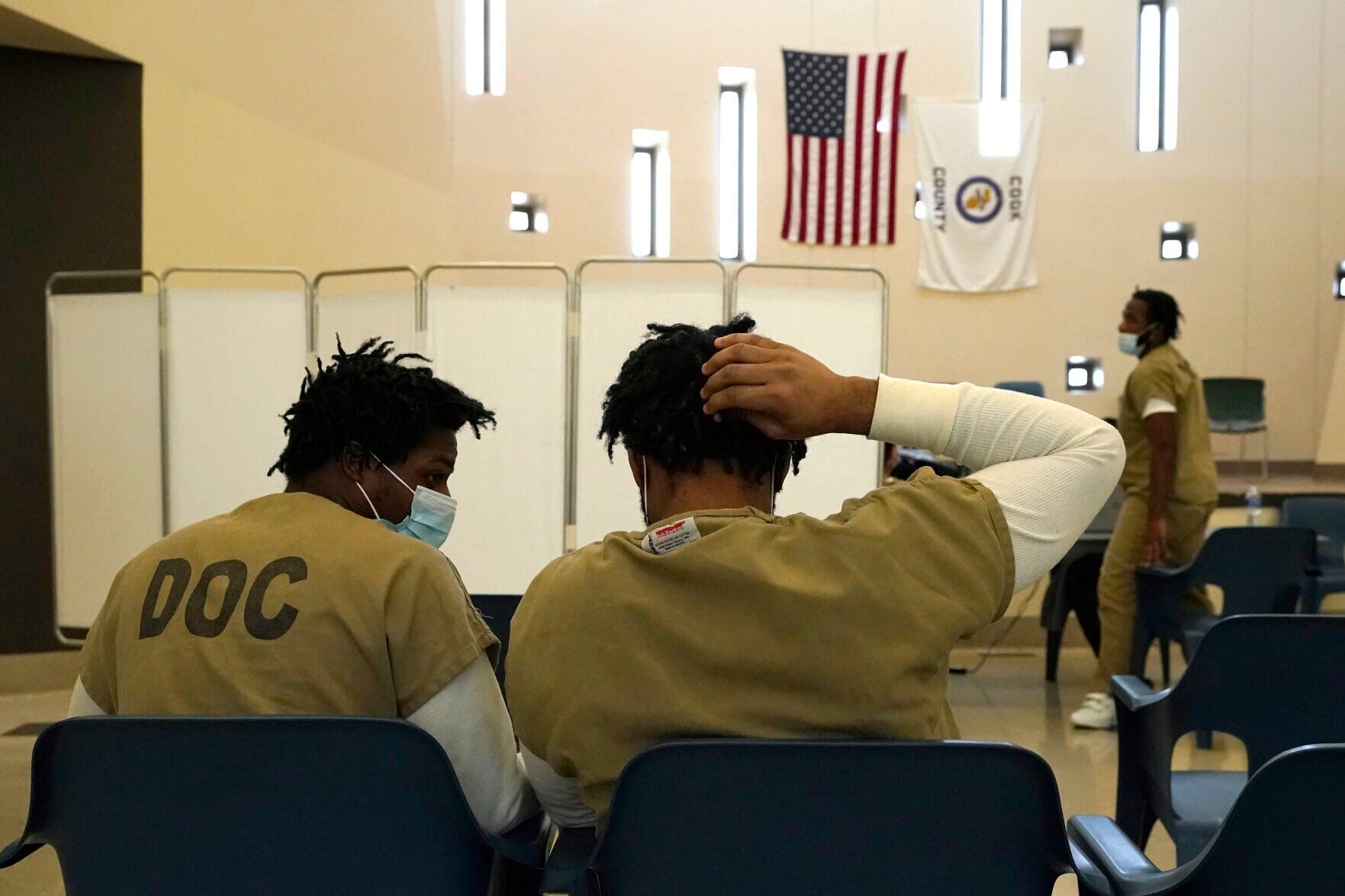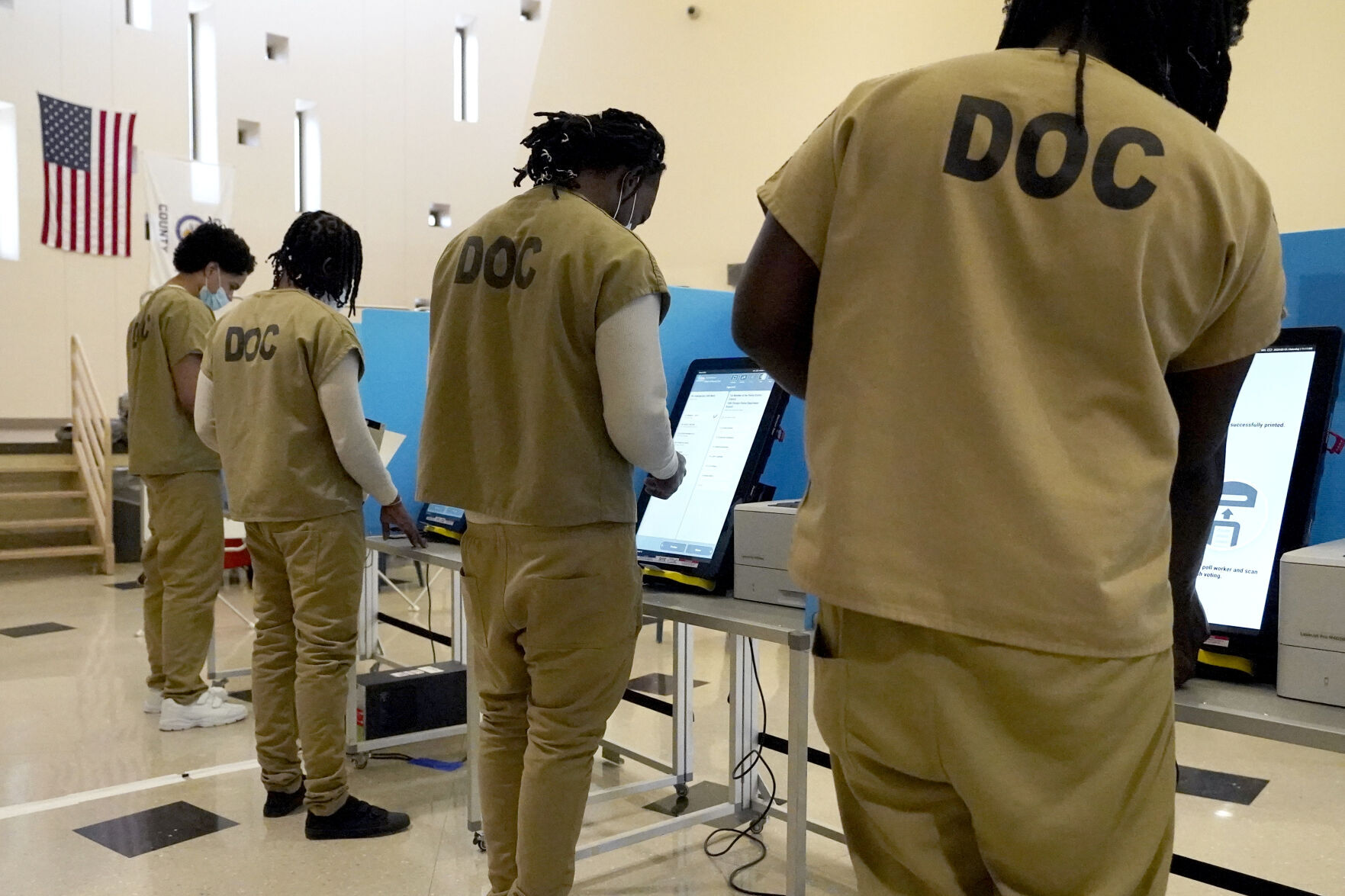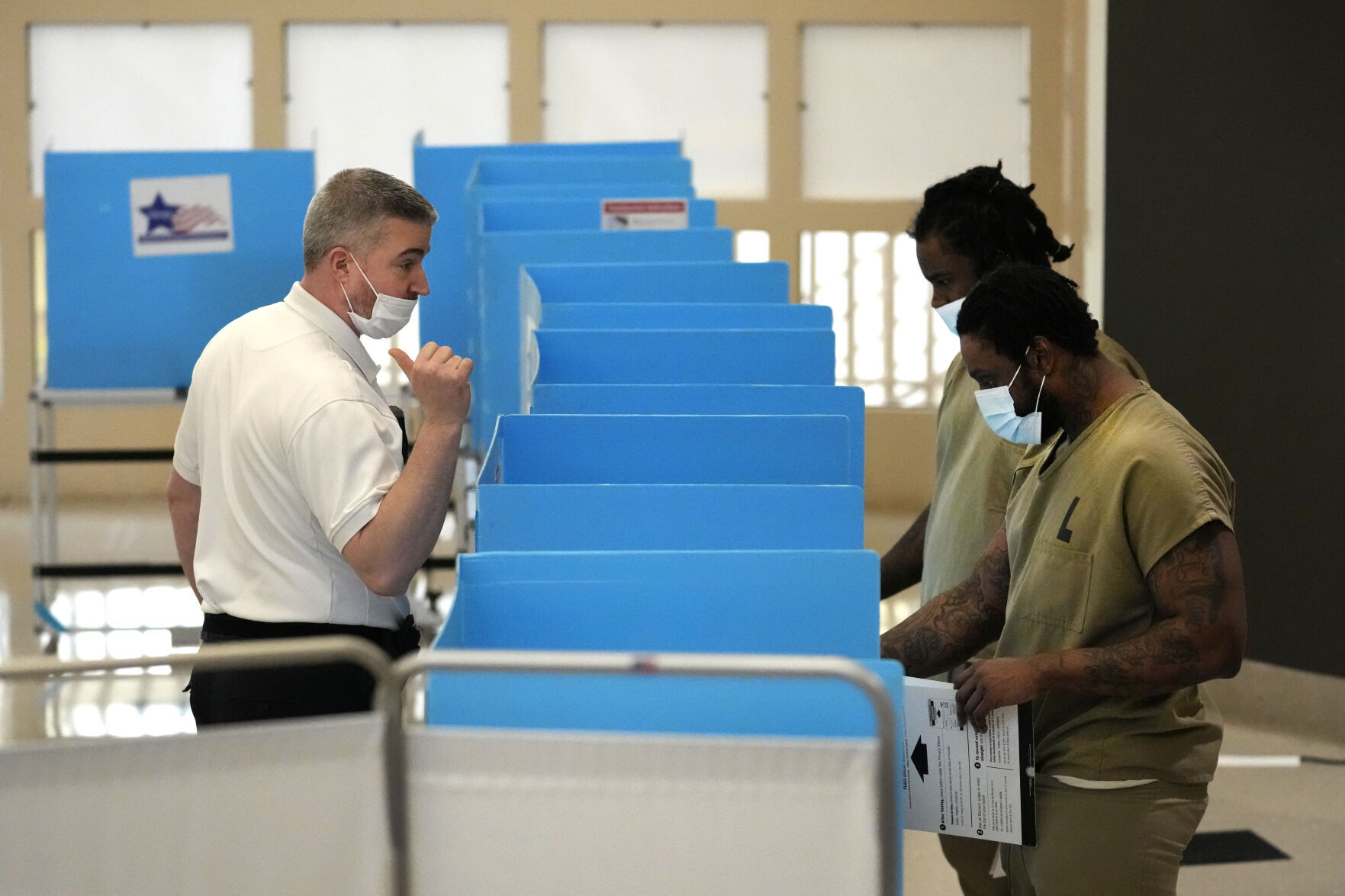CHICAGO — The voting precinct could have been any one of hundreds throughout Chicago, except that these voters in the first round of the mayoral election were all wearing the same beige smocks. And the security at this polling place wasn't intended to keep disrupters and campaigners out, but the voters in.
When first-time voter Tykarri Skillon finished studying the list of nine candidates, looking for those who shared his priorities on jobs and affordable housing, he marked his ballot and then was escorted with other voters back to their cells in the Cook County Jail. "It feels good to have a voice," he said after casting his ballot during early voting.

Inmates at the Cook County, Ill., jail wait to register and vote Feb. 18 in a local election at the jail's Division 11 Chapel in Chicago.
The 25-year-old, awaiting trial on a weapons charge, is part of a group not always mentioned in discussions about voting disenfranchisement. People serving sentences for felony convictions lose their right to vote. Detainees awaiting trial or serving misdemeanor sentences do retain that right, but face barriers to exercising it in many parts of the United States.
The Cook County Jail, with more than 5,500 inmates and detainees, is one of several lockups where voting rights advocates worked with local election and jail officials to offer voting for those held there. The list includes jails in Denver; Harris County, Texas; Los Angeles County; and the District of Columbia.
The most recent survey from the federal Bureau of Justice Statistics, released last December, showed that 451,400 of the 636,300 people held in jails across the country had not been convicted and thus should retain their right to vote.
Voting rights for pretrial detainees and inmates serving sentences for misdemeanors were upheld in a U.S. Supreme Court decision from 1974, in a case from New York, O'Brien v. Skinner.
Despite that ruling, voting rights advocates say a "de facto disenfranchisement" exists because of mistakes over eligibility and the difficulties that detainees and prisoners face in registering or voting.
In a 2020 report, the Prison Policy Initiative focused on three main reasons: registration is difficult due to issues such as mail-in ballot deadlines and voter ID laws; detention does not meet the criteria for absentee voting in some jurisdictions; and the churn of the jail populations.
At least one state, Tennessee, had a bill introduced this year to address one of the barriers. Being in jail as a pretrial detainee is not one of the reasons considered valid for granting a mail ballot request, said Democratic state Sen. Jeff Yarbro, the bill's sponsor. Yabro, who recently announced he was running for mayor of Nashville, wants that changed.

Inmates at the Cook County, Ill., jail vote in a local election Feb. 18 at the jail's Division 11 Chapel in Chicago.
In Harris County, Texas, which includes Houston, about 75% of the nearly 10,000 people held in jail are pretrial. The sheriff's department established a polling place there in 2019, working with the county elections office, and allowed voting during the past two election cycles. Before that, detainees voted only by mail.
The move started in 2017 with the Houston Justice Coalition and an initiative known as Project Orange that helped register thousands of detainees and taught them how to navigate the mail ballot process, Nadia Hakim, a spokeswoman for the Harris County Elections Administration, said in an email.
However, someone booked after the mail ballot deadline would not be able to request a mail ballot, Hakim said. With the in-jail polling place, all detainees can vote, as well as members of the staff and public because machines are available in secure and public spaces. In last November's election, 528 people checked in to vote there, including detainees, employees and members of the public, she said.
In California, Los Angeles County Sheriff's Department Capt. Roel Garcia said staff members let pretrial detainees know they can register, vote and hold voter registration drives. Garcia said the department works with groups such as the League of Women Voters to get information to the detainees about candidates and issues on the ballot.
The department and the Los Angeles County Registrar-Recorder/County Clerk teamed up on a pilot program since 2020 that allows voting in two jails. There are plans to expand it to all eight county jails in 2024.
Registrar Dean Logan said as many as 11,700 people could be eligible at a given time when the voting goes countywide and it could serve as a model for other counties.

Cook County Corrections Sgt. Robert Mulac talks with inmates at the jail as they vote in the local election Feb. 18 at the Division 11 chapel in Chicago.
A 2019 state law required jails to take steps to enable voting by detainees who have not been convicted. Smaller jails aren't required to have polling stations but must arrange for absentee ballots.
Cook County Sheriff Tom Dart said the jail helps organize classes to instruct inmates and detainees on everything from the electoral process to the rationale behind judicial elections. Detainees are able to tune in to televised candidate debates.
"Their election IQ is off the charts," Dart said. "Participation level, turnout — is higher than it is outside."
The sheriff's office said about 1,500 inmates and detainees — roughly 27% of the jail's population — voted during the first round of the Chicago mayoral election.
The Chicago Board of Elections brought in several voting booths this year along with a large ballot-collection machine and put them in a section of the jail called "the chapel," normally used for religious services and small concerts.
With just a few guards, half a dozen board of elections staff managed the jail polling stations, first helping with registration.

Post a Comment